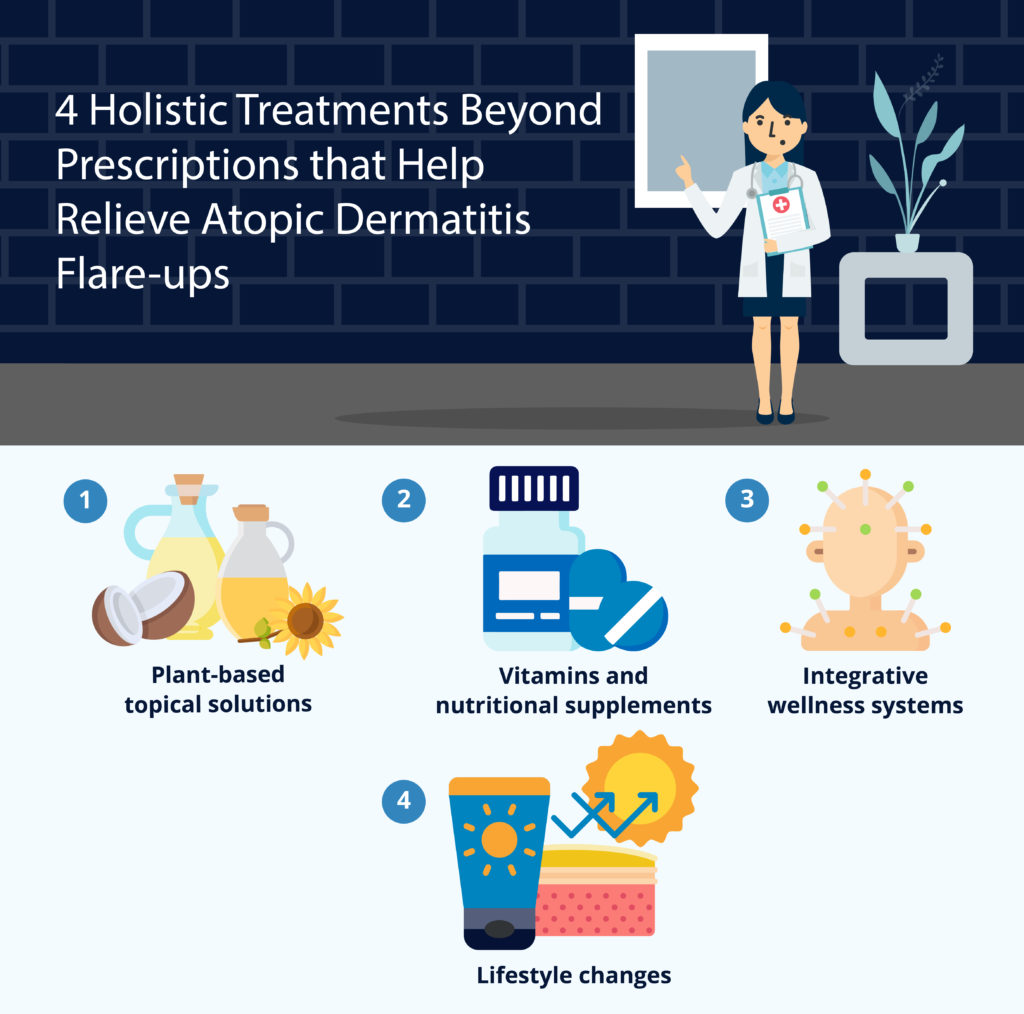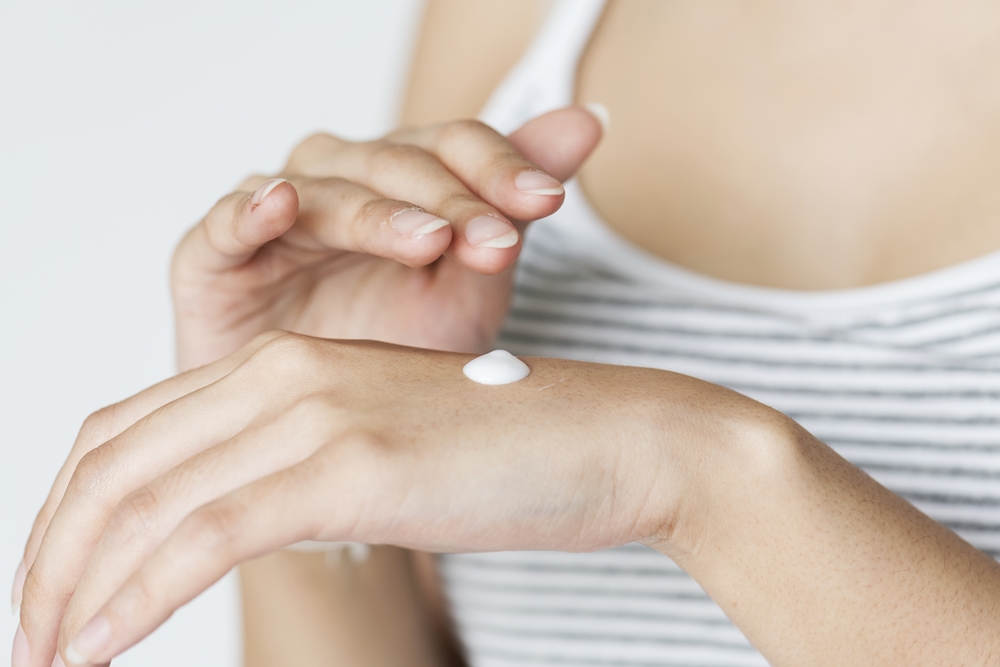
You can always think of other ways to add more items to your list of eczema flare-up relievers. There could be moments where flare-ups happen, and you need to have complementary or supplementary treatments to add to your prescribed medications. Thankfully, there are holistic ways you can relieve your eczema flare-ups. These can also be helpful to complement and supplement your current prescribed treatments. Here are some of them:
1. Plant-based topical solutions
There are a lot of herbal remedies that can be used for eczema symptoms and other skin conditions. Some of the most popular ones are:
- Applying sunflower oil on your skin boosts and strengthens the skin barrier. It can help retain moisture and prevent inflammation. Put some on your skin twice a day after a bath while it is still damp. Do not use this oil if you are allergic to sunflower seeds.
- Applying coconut oil to your skin reduces the buildup of bacteria, particularly staph bacteria. It can reduce the chances of infection when you have skin conditions like eczema. Put some on your skin once or twice a day after a bath, while it is still damp. Make sure you only choose virgin coconut oil or cold-pressed coconut oil.
2. Vitamins and nutritional supplements
With the abundance of vitamins and nutritional supplements everywhere, people turn to them to at least help in the relief of inflammation, itching, and other symptoms. The most common supplements that are used during flare-ups are those that help boost the immune system or help get a good night’s sleep. Some of the popular ones with eczema are:
→ zinc
→ selenium
Take note that not all vitamins and supplements work for everyone. It is important that you find out first what works best for you and stick with it. There are also some vitamins and supplements that cannot be taken together. Consult with your doctor before ingesting anything and recommend doing a blood test to make sure you are okay to take these supplements.
3. Integrative wellness systems
There are a lot of wellness systems that are taking over the healthcare industry right now. These practices are mostly based on ancient methods that are proven to still be effective. The most popular ones come from traditional Chinese medicine and Indian ayurvedic medicine. Here are some of the integrative wellness systems that help relieve flare-ups and eczema symptoms.
→ traditional Chinese medicine
- TCM is an ancient wellness practice of balancing the aspects of human health. The most famous methods include acupuncture, cupping, and Gua Sha, and the use of medicinal herbs such as roots, stems, and leaves of plants that are turned into powder, liquid, or topical solutions.
→ ayurveda
- Ayurveda means “knowledge of life” that also brings balance into the body. This method makes use of herbs, oils, dietary changes, massages, yoga, and meditation. It helps in relieving skin conditions because they help determine imbalances, how the body functions, and how it might react to what you eat or put on your skin.
- This is a more advanced technique in which you control stress through mind and body balance. Since stress is one of the causes of flare-ups due to produced chemicals that lead to inflammation, managing stress is a good way to relieve it.
- Mindfulness meditation is a mental practice that makes use of concentration to train the brain to stay focused, achieve mental clarity, and emotional calmness. This method also relieves stress and promotes overall relaxation.
- These three practices are more on combining body movements with proper breathing and meditation. It helps with achieving focus, clarity and overall relaxation. It has been proven that these methods are a gentler form of exercise and helps reduce stress, inflammation, and a good way to distract the mind from scratching an itch.
- Acupressure is applying physical pressure to certain parts of the body but without the use of needles as with acupuncture. This method helps relieve itching and thickening of the skin. Massages also relieve stress that can also help reduce eczema flare-ups. Just make sure you get an accredited and licensed therapist to do this and check the oils that they will use for this method.
4. Lifestyle changes
Changes in your lifestyle can make a difference in terms of dealing with eczema flare-ups. For this to take effect, you should be able to drastically adjust your habits and routine to match the needs of your skin. Some of the daily activities that you should change include:
→ the ways in which you clean and take care of your skin
- This means sticking to skincare products that are mild and gentle.
→ avoiding products that contain irritants
- This can include avoiding foods that can cause allergic reactions and avoiding the use of certain items that may contain harmful chemicals.
→ staying at the proper room temperature
- This would mean maintaining a balanced body temperature that is not too hot, too dry, or too cold.
→ limiting harsh outdoor activities that cause sweat and sources of allergens
- This is to avoid getting too sweaty and itchy, and trying to avoid going to places that are too dusty, polluted, or full of airborne particles.
→ recognizing and avoiding sources of emotional, physical, or mental stress
- This means being aware of what you are feeling and taking good care of your wellbeing. The NALA app can help with this. Simply send a message to [email protected] so you can be onboarded. Time to get the support you need for clear, healthy skin!
→ resisting the urge to scratch
- You cannot just scratch when there is an itch. You have to practice self-control.
Final Thoughts
These are just some of the many ways you can help your skin beyond your prescribed medications. Since there is no known cure for eczema, you must manage flare-ups and prevent triggers. Of course, it is still highly advised that you consult with your doctor about anything concerning your skin condition or before doing anything else besides your prescribed medication.


